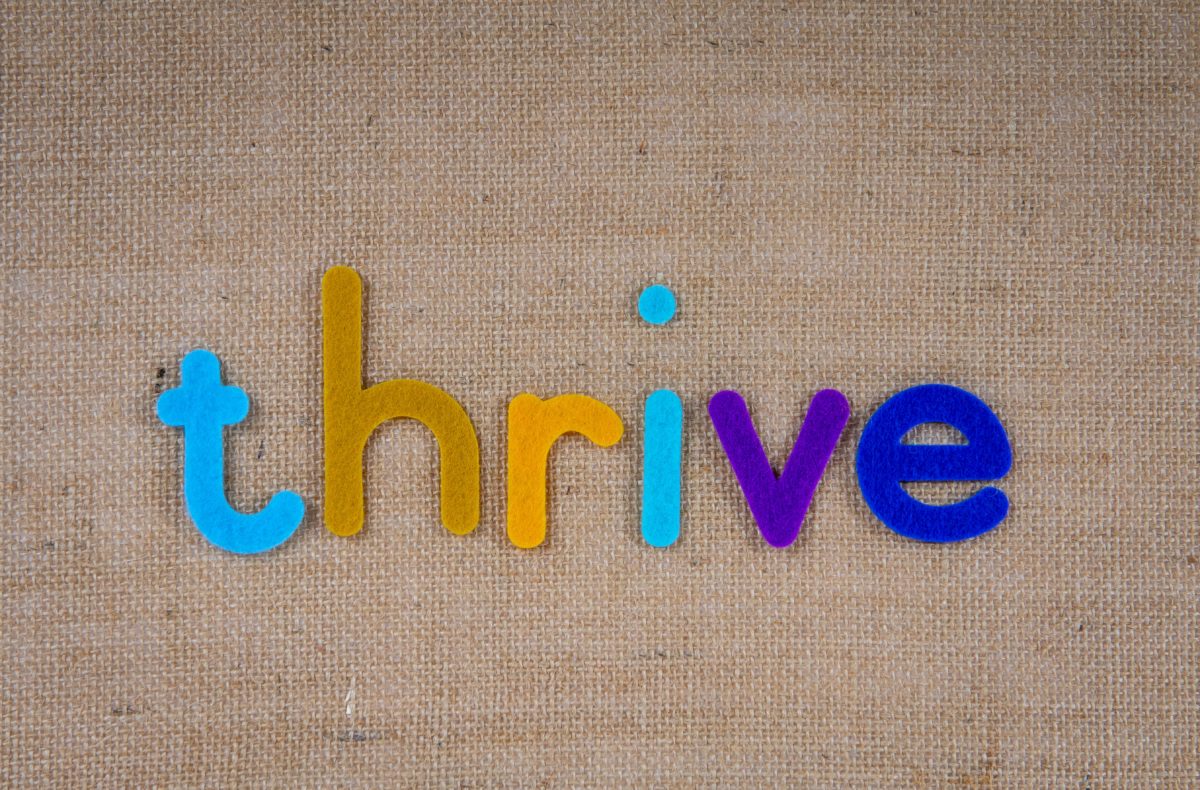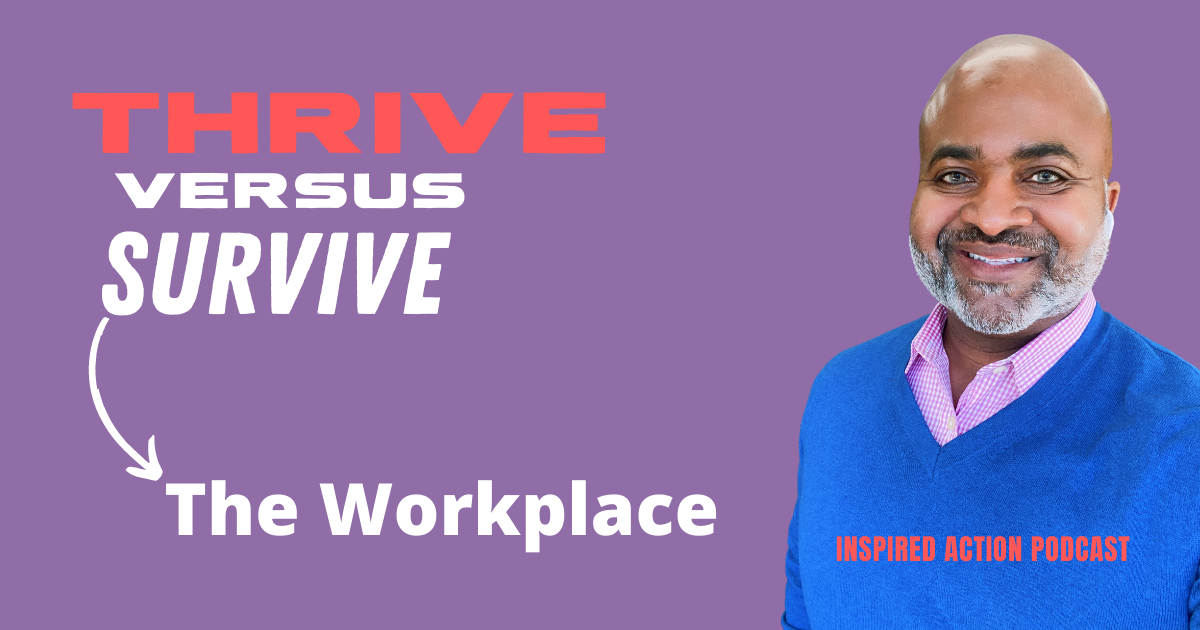“Thrive Versus Survive The Workplace” Brief Summary of Show:
Are you feeling burnt out? Feeling the weary and wary of the pandemic? In this Inspired Action For Imperfect Humans podcast episode Christopher Lawrence and Kyle Kalloo tell stories about environments where they were surviving, environments where they were thriving, and discuss how we can get back to thriving in the workplace versus surviving the workplace.
Calls to Action:
Tell us your “inspired stories” stories by visiting www.InspiredActionPodcast.ca
Christopher Lawrence LinkedIn: https://www.linkedin.com/in/career-life-coach-christopher-lawrence/
Kyle Kalloo LinkedIn: https://www.linkedin.com/in/kyle-kalloo/
Change My Life Coaching & Partner Groups LinkedIn: https://www.linkedin.com/company/6446498/admin/
Change My Life Coaching: https://changemylifecoaching.ca
Strategic Leader: https://strategicleader.ca
“Thrive Versus Survive The Workplace: Transcript:
People who are happy and thriving are are 12% more productive.
[Narrator] Is the thought of being imperfect keeping you from taking action? Welcome to “Inspired Action for Imperfect Humans”. Each week, we give you real life stories and thought provoking research that inspires your soul to live a more fulfilled life through your own actions. From the heart of Calgary, Canada. Here are your hosts, award-winning coaches, Christopher Lawrence and Kyle Kalloo.
Hello, team.
Hello, Christopher Lawrence.
Christopher here, I wasn’t going to do “hello hello hello”, because every time you start a podcast, you say three hellos. And I just feel like it’s too many hellos.
Okay. Well, how do you know that doesn’t make me thrive when I’m starting a podcast?
Well, I don’t have insight into how your brain works. And quite frankly, it’s a terrifying place.
If I had five minutes in your brain, I know I’d be exhausted. That I know, I’d be exhausted.
Well, because there’s so much achievement happening. Oh my God. Can’t even, can’t even handle it, so much achievement.
Oh boy. So what are we talking about today? What is this all about?
Man, so, okay, so this is interesting. I thought, you know, because you’re the great leadership and business coach extraordinaire.
Okay, what did I do? What’s happening? When is the shoe going to fall? What?
No, I believe that it’s true.
Oh, wow! Do we have that in writing, or recorded, or?

No, I’m deliberately not recording this podcast. I’m just doing it to waste your time. No, I was kinda thinking about this. I’m looking at it and it’s like, it’s amazing to me how burnt out people still are, you know, in this, are we even in a post pandemic world? I don’t know. By the time this comes out, we might be in another one. Doom and gloom, sorry. So my question is, how can people, individuals, employees, workers, team members, and leaders, how can we get back to thriving in the workplace? As opposed to surviving in the workplace? Because I feel like even some people are barely surviving.
Mm-hmm. That’s really interesting that you said that, but let me just back up for a second. What we do know is when a trauma or a pandemic, something like this happens, people tend to revisit their life, their work, things that they do, their friendships, their relationships, right? Like they tend to just re, they look at, they look at everything, like, for those who’s, you know, an example of this could be someone who’s experienced a family member who has passed away, right? Then they’re just like, “What does this all mean? “Am I living my life? “Life is too short”, and all this stuff is happening. And I think what’s happening right now with this whole pandemic piece, people are actually questioning employees, employers as well, but mostly employees are questioning, “Do I even want to go back to this job? “What if they call me back”, for those people who were laid off, right? Or those people who are looking for another job, do I want to go back to this industry? You know, interestingly enough, I had a client who said to me, “Kyle, I don’t know what’s going on, because, you know, “we’re posting these jobs that we had people in “and we’ve called these people back “and they’re not coming back”. Right, and what we’re finding in the workplace right now is that maybe prior to them leaving, they weren’t thriving. The environment may not have been there, that they could thrive. And we all want to thrive regardless of what people say and think, in my many years of being on this world, I could tell you, we want meaningful work. You and I, Christopher, have done jobs that didn’t pay us a lot, the hours were probably shitty, something else was happening there, but we enjoyed the job. It was fulfilling to us, right? Something was there that kept us there, and so either we were thriving personally, or the organization that we were with is thriving. And that speaks to people who volunteer, right? Do you remember a job, that you weren’t thriving?
Where I wasn’t thriving?
Yeah, you was not, you were not, and then you went out,
Oh, for sure.
Okay.
Why don’t you tell a story about one though? It’s always my stories. I want to hear you talk about a job where you weren’t thriving because you actually sucked at something.
There’s not a lot of those jobs where I wasn’t thriving, but no, I remember working with a property management company and it started off great. Things were going great, but then there were things that were happening that I was no longer thriving, and people around me weren’t thriving. There was no collaboration. The company itself didn’t really adapt to change or innovation, and people were not engaged. I wasn’t engaged, right? And every time I got there, I thought, “Oh damn, I have to go to this job “because I know the arguments I’m going to have. “I know the emails I’m going to have to respond to”. Like, things in this environment was just not there, right? There was no opportunity to actually-
What job was this?
In property management. I said that, no?
Oh, sorry. I was looking at an interesting statistic, sorry.
Well, hold that statistic in a second. And so, and then I think about jobs that I was really thriving. You know, I remember my first really, really real kind of job as I was moving throughout the organization, different role at McDonald’s. I mean, and there’s something, McDonald’s didn’t pay me a whole bunch of money. There wasn’t a lot of money, like no one works at McDonald’s to be rich, right? And once you get into the senior level, but where I was thriving was I worked with some amazing people. There were opportunities where people wanted to collaborate and talk and troubleshoot and, you know, learn how to do things better. People were naturally engaged, right? There was a connection and there was opportunities to be innovative, I mean, God, there was always a new sandwich or a new product or monopoly or some incentive or something that really kind of got people into that thriving state. And so when you experience a thriving environment, and I’m going to tell you three things you can do to ensure that you are thriving in the workplace, if you are a leader, or if you’re a follower, you know, you could also influence that as well. But I’m telling you, people who thrive in organization, there’s a direct correlation to productivity. There’s a direct correlation to retention, right? People will stay longer. People will produce more. They will be so innovative in your business that they’ll think about things you never thought about. So before I get into those three things though, Christopher, what is some of the research that you’re kind of pulling up?

Well, it’s interesting, you know, it’s interesting because, I have, I have a similar story too, just, I’ve found in all of my jobs that I’ve had moments of thriving and times where I didn’t thrive. And I think it’s really important, the times that you’re not thriving, it can be a really, really difficult place. And I think just kind of given where the world has gone, where the workplaces have gone, I think that we need to allow people to feel like they’re thriving. We need to support people in their thriving, more deliberately than we ever have before. The issue is that we know that most leaders, what some of the research is showing is that right now, our leadership are burnt out and they want to quit too, more than ever. And so people are resigning like crazy, people are unhappy like crazy. I have so many clients that they’re, they’re kind of at their, I mean, let’s face it, you know, these executives predominantly are still taking big bonuses while they’ve done a bunch of layoffs and people. And the people that are left behind are left holding the work because there’s no less work necessarily, just because they’ve let people go. I have so many clients right now who are in this position, and I’m like, “Well, if you’ve got nothing to lose, “then you should ask for exactly what you want”. Like, if you’re literally ready to walk out the door tomorrow, then you should ask for what you want. And it’s amazing to see what these clients are actually getting. Here’s the thing, this is, this is the part that I think people are missing, right down to some of the statistics or some of the suggestions that you were, that you were making, people who are happy and thriving are 12% more productive. So 12% doesn’t sound like a lot, but it’s a huge amount, because it becomes exponential. They have happy team members, have less turnover by about 71%. Which decreases the amount of resources you need to onboard new people too. Right? And actually one of the studies shows that happy employees help you outperform your competition by 20%.
Wow, absolutely, that’s the productivity piece we’re talking about.
Now, here’s something that’s interesting, unhappy employees who are not thriving will rack up as much as 50% more in health care expenses.
Damn, wow.
Which costs the company, like, that always, healthcare issues always cost the company.
And then, also there, then obviously the productivity, because if they can’t be at their best, or things are taking longer, right? I mean, and I think this is a piece that I find, sometimes some leaders don’t connect back into. They don’t see the, what I call sometimes the hidden cost, right? The hidden cost of someone who has higher sick time, the hidden costs around someone who’s not as engaged in the environment, right? There’s so many hidden costs to that. The time spent with an employee, the squeaky wheel, so to speak, right? That’s taking from leadership and the hidden cost of not actually encouraging the people who are the steady eddies, the people who are doing the good job, and they end up checking out because there’s an indifference of “They won’t even know if I left “because they don’t really talk to me. “They spend all their time with the squeaky wheel”, right? And I think those are the constant things.
Tolerating the worst behavior.
Absolutely, right? Or creating systems and policies just to catch the one or two people who don’t do it well.
That’s it, like how many policies have we seen implemented at big organizations, because one person took advantage of something or made a really big mistake and it’s like, you know stuff that, I get it if it’s like a loss of life, or risk of injury, I totally get it. But when we’re talking about like, fucking vacation policy, you know, I look at, like, Jeff Bezos is constantly under fire for this, because he’s severely underpays his, same thing with the, with the family that owns Walmart because they don’t take good care of their people, and I’m like, but, but you are losing, you’re losing on hidden costs, but I don’t think they actually care. Like, I just think they see these as, as turnover, you know, their turnover positions and as the cost of doing business and people are like, you know, we saw an interesting thing on LinkedIn about, you know, somebody said, “Nobody has to stay anywhere, we all have a choice”. And I’m like, I think that’s partially true. But as somebody who’s been coaching careers consistently for the last nine years, I can also tell you that there is an issue here because employment opportunities are becoming limited.
Right.
Because they’re being replaced with automation, so those middle, mid-level jobs, lots of them are being replaced with automation, which means that basically you either have to upscale and get into a higher role, which is much harder to do. And some people can’t because upscaling costs money. Education is not free, even in Canada. When you look at post-secondary education, it is not free. Not everybody qualifies for a student loan in this country.
Right.
Right, we get free, free-ish education up to grade 12. Right, grade 13, if you’re in Ontario. Or did they abolish grade 13, I can’t remember.
Yeah, they did. They did finally got rid of them.

But, you know, but then, so then you get these low-level jobs just to make ends meet while low-level jobs are working in Jeff Bezos’ warehouse or being a Walmart greeter. And so I, you know, again, it’s not doom and gloom and it’s not just that, like, I, I don’t want people to think that I think that those are the only options. Certainly there is other stuff out there and new industries are being created. And as tech does create automation, there’s just going to be different opportunities. Just like during the industrial revolution, some people are going to lose their jobs, but there will be opportunities to rescale in other things.
Right.
It’s just that we take a dip during those periods. And I look at these people who are under fire over this, and actually they don’t care. Like they don’t care.
Based off results. You can’t care and have that.
Based off of results, Jeff Bezos does not give a shit about you. All he cares about is if you’re buying his products, the Walmart family does not give a shit about you. They only care if you’re buying their products, right. The whole deal, right? And so it’s like, you know, I’m all about supporting local small business. And in the same sentence, if Amazon has something that’s 50% cheaper, it’s pretty hard to justify that cost, you know, because it’s the right thing to do when you’re on a limited budget.
Right.
So I think it is a very complex thing. And I think that there needs to be more and more opportunity for thriving.
Yeah, and Christopher asked the original question you heard in the beginning, is what can you do to ensure that you’re thriving in the organization? So I’m going to give you three things as an perfect inspired action that you could be thinking about. If you’re a leader, about what can you do to ensure that your organization is thriving, as well as if you’re an employee. These are things that I would say for you to tap into to ensure that it’s happening for you to have a more fulfilling experience while you’re in an organization, because not everyone can just leave an organization, go to the next organization. You know, I read, saw something the other day that says, you know, people usually think the grass is greener on the other side. However, the grass is green where you water it. So as a leader, as a follower, here’s some things, this is your watering, so to speak. Is the ability to engage your employees. And as an employee, the ability to be engaged, right? The second part is collaborate, right? Opportunities to be clear in your communication and step into communication without fear of conflict, right? Because sometimes people don’t want to say anything, ’cause someone’s going to say something, but collaboration is really key because we are way more connected when we can collaborate with each other. The third thing I would say is also adapt, right? This is where we are able to be flexible. You know, we had to do it during the pandemic, right? Businesses also had to do, businesses who told you you couldn’t do your job at home, right? They said, “Oh, there’s no way you can do this job at home”. They adapted, and those who did, did very well, or better than those who didn’t, right? When we can understand what these three things mean, so each of us, as an employer, as an employee, we’re going to be in a better place. That is the ingredient of a thriving workplace. So let us know how you’re thriving in your workplace. What are some things that you want to be mindful of? Even if it’s just one of the three things, let us know. Until next week, take care of yourself.
[Narrator] It’s our goal to build a global community of inspired action takers. And we can only do that with your help. So if you love “Inspired Action”, please leave a review on your favorite podcasting app and share us on your socials. You’ve heard from us. Now we want to hear from you. Go to inspiredactionpodcast.ca and tell us what is the inspired action you took this week. Next week, on “Inspired Action for Imperfect Humans”.
I see starting your day the right way as an investment in the rest of your day.



